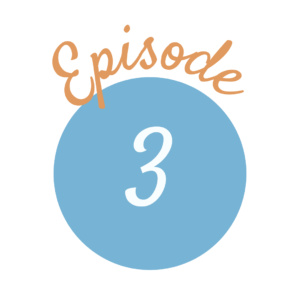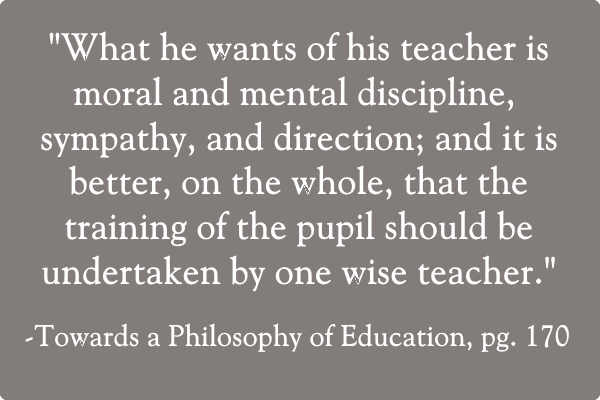
Charlotte Mason has a unique view of the student and the way in which he learns. This episode focuses on the role of the teacher and how his responsibilities and approach to teaching likewise take on a different perspective in her method. Nicole, Emily and Liz begin with a comparison of traditional teaching qualifications versus Mason’s requirements for teachers, concluding with the life-changing help every teacher has at her disposal.
Listen Now:


“We may not despise them, or hinder them (‘suffer the little children’), or offend them by our brutish clumsiness of action and want of serious thought; while the one positive precept afforded to us is ‘feed’ (which should be rendered ‘pasture’) ‘my lambs,’ place them in the midst of abundant food.” (Towards a Philosophy of Education, pg. 81)
“[Y]ou may bring a horse to the water, but you cannot make him drink. What I complain of is that we do not bring our horse to the water. We give him miserable little text-books, mere compendiums of facts, which he is to learn off and say and produce at an examination; or we give him various knowledge in the form of warm diluents, prepared by his teacher with perhaps some grains of living thought to the gallon. And all the time we have books, books teeming with ideas fresh from the minds of thinkers upon every subject to which we can wish to introduce children.” (School Education, pg. 171)
“[T]he great recognition, that God the Holy Spirit is Himself, personally, the Imparter of knowledge, the Instructor of youth, the Inspirer of genius, is a conception so far lost to us that we should think it distinctly irreverent to conceive of the divine teaching as co-operating with ours in a child’s arithmetic lesson, for example. But the Florentine mind of the Middle Ages went further than this: it believed, not only that the seven Liberal Arts were fully under the direct outpouring of the Holy Ghost, but that every fruitful idea, every original conception, whether in Euclid, or grammar, or music, was a direct inspiration from the Holy Spirit, without any thought at all as to whether the person so inspired named himself by the name of God, or recognised whence his inspiration came.” (Parents and Children, pg. 270-71)
“Let this be the mother’s key to the whole of the education of each boy and each girl; not of her children; the Divine Spirit does not work with nouns of multitude, but with each single child. Because He is infinite, the whole world is not too great a school for this indefatigable Teacher, and because He is infinite, He is able to give the whole of his infinite attention for the whole time to each one of his multitudinous pupils. We do not sufficiently rejoice in the wealth that the infinite nature of our God brings to each of us.” (Parents and Children, pg. 273)
“[W]e perceive that the great work of education is to inspire children with vitalising ideas as to every relation of life, every department of knowledge, every subject of thought; and to give deliberate care to the formation of those habits of the good life which are the outcome of vitalising ideas. In this great work we seek and assuredly find the cooperation of the Divine Spirit, whom we recognise, in a sense rather new to modern thought, as the supreme Educator of mankind in things that have been called secular, fully as much as in those that have been called sacred.” (School Education, pg. 173)

If you would like to study along with us, here are some passages from The Home Education Series and other Parent’s Review articles that would be helpful for this episode’s topic. You may also read the series online here, or get the free Kindle version from Fisher Academy.
Parents and Children (Volume 2), Chapter 25
School Education (Volume 3), Chapters 1-3
Towards a Philosophy of Education (Volume 6), Chapters 5 and 10, section 2

Mornings in Florence, John Ruskin
(Contains affiliate links)



Wow. I just love this podcast! So encouraging! I appreciate your short lessons, but I wish sometimes the three of you could talk on and on! 😉 (love the little baby coos, btw, swoon!) I've been looking up some of these things and I'm writing out many of the quotes you share on note cards…my window ledge around my sink is becoming a little CM quote spot! I want to heartily agree with what you were talking about how FREEING this sort of philosophy is…we still have work to do persae, but it's a coming alongside of our children, sharing great ideas, instead of having to "know it all". It is truly LIVING too, so rarely does the content feel burdensome, if you know what I mean. Sure, the day to day is a challenge sometimes with housework and school and relationships, BUT the things we share and learn are "easy and light" because of their beauty and the Lord's presence. Anyway, I'm blathering…all that to say, I am so thankful for this philosophy & methods! Amy
What wonderful thoughts you've shared with us! Thank you!
It is so freeing, isn't it, when we can trust the method because it consistently points back to the Great Teacher. That is a truth we can *rest* in, knowing that if we are faithful in our work HE will be faithful to bring it to completion.
Thanks so much for sharing. Have you read all this before or have you been reading in volumes you haven't previously? Every time I re-read sections of Mason's volumes, new things stand out to me.
-Emily
p.s. I'm also very grateful that Silas' coos are not distracting to our listeners, he is such an agreeable baby to have along on this journey of recording!
I've read some of this before and some of it is new to me…it has taken me a few years of immersing myself in CM studies to finally tackle all of her Volumes…I'm getting there! But you are so right. There is SO much in each volume that you probably could reread them forever and learn something new each time, right?! 🙂 Thanks again for doing this podcast!
And they just keep getting better!
As always, thank you!!! I love that quote from Parents and Children about the mother's key and the Spirit's infinitude. I'm going to share it with my co-op moms this Friday 🙂
Guess what I saw at a book store the other day, a very old copy of Ruskin's Mornings in Florence! It was so fun to peek at it right after having listened to this. 🙂
If I may, your last quote “[W]e perceive that the great work of education is to inspire children with vitalising ideas as to every relation of life, every department of knowledge, every subject of thought; and to give deliberate care to the formation of those habits of the good life which are the outcome of vitalising ideas. In this great work we seek and assuredly find the cooperation of the Divine Spirit, whom we recognise, in a sense rather new to modern thought, as the supreme Educator of mankind in things that have been called secular, fully as much as in those that have been called sacred.” comes from School Education and not Towards a Philosophy of Education… said the woman who was trying to find the quote in the Modern English paraphrase in order to translate it in French 😉
Merci, Fannie!
I have edited it above! And I hope you’ll translate CM’s actual words…I’ve found the paraphrase misleading in English at times.